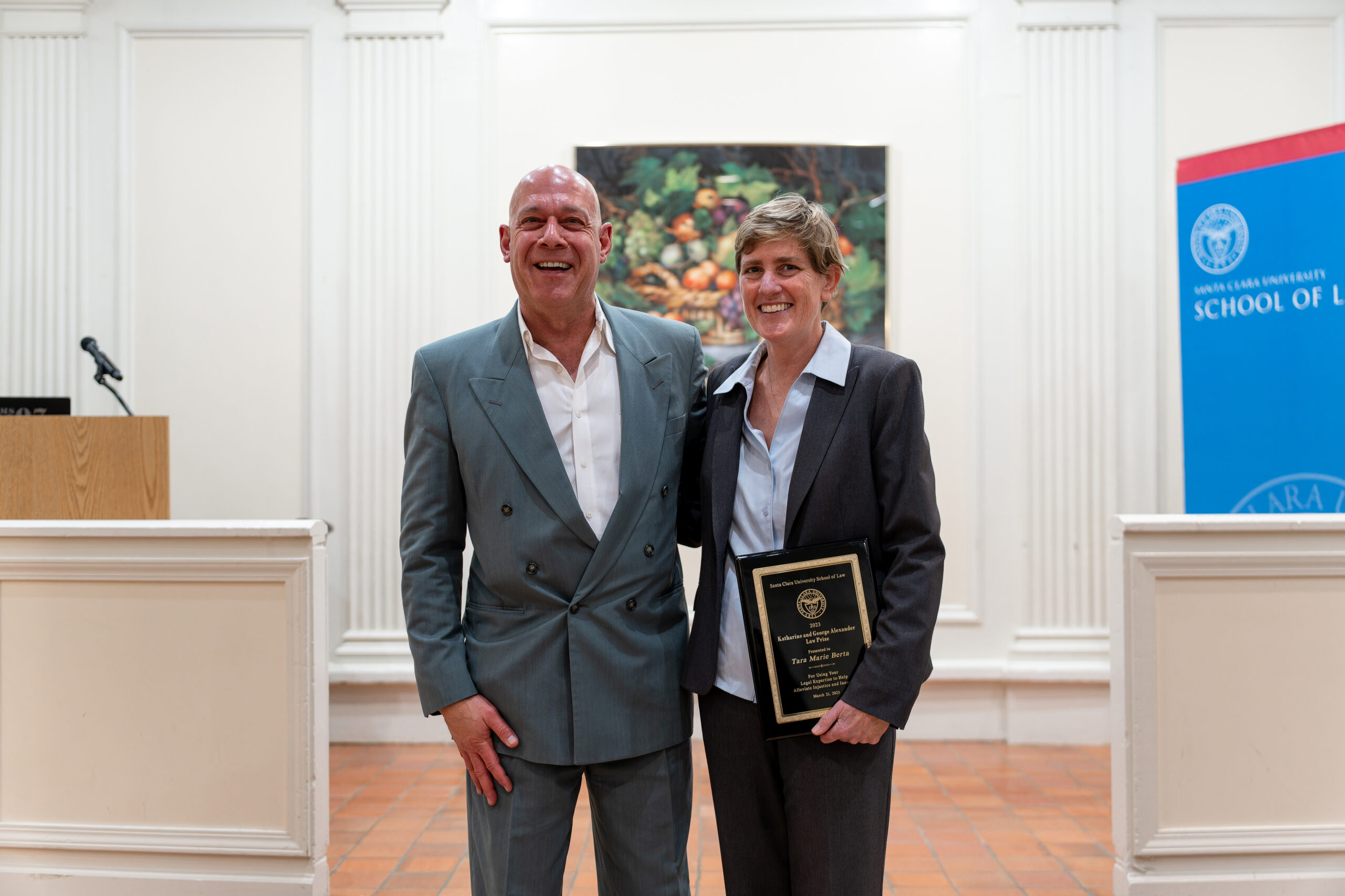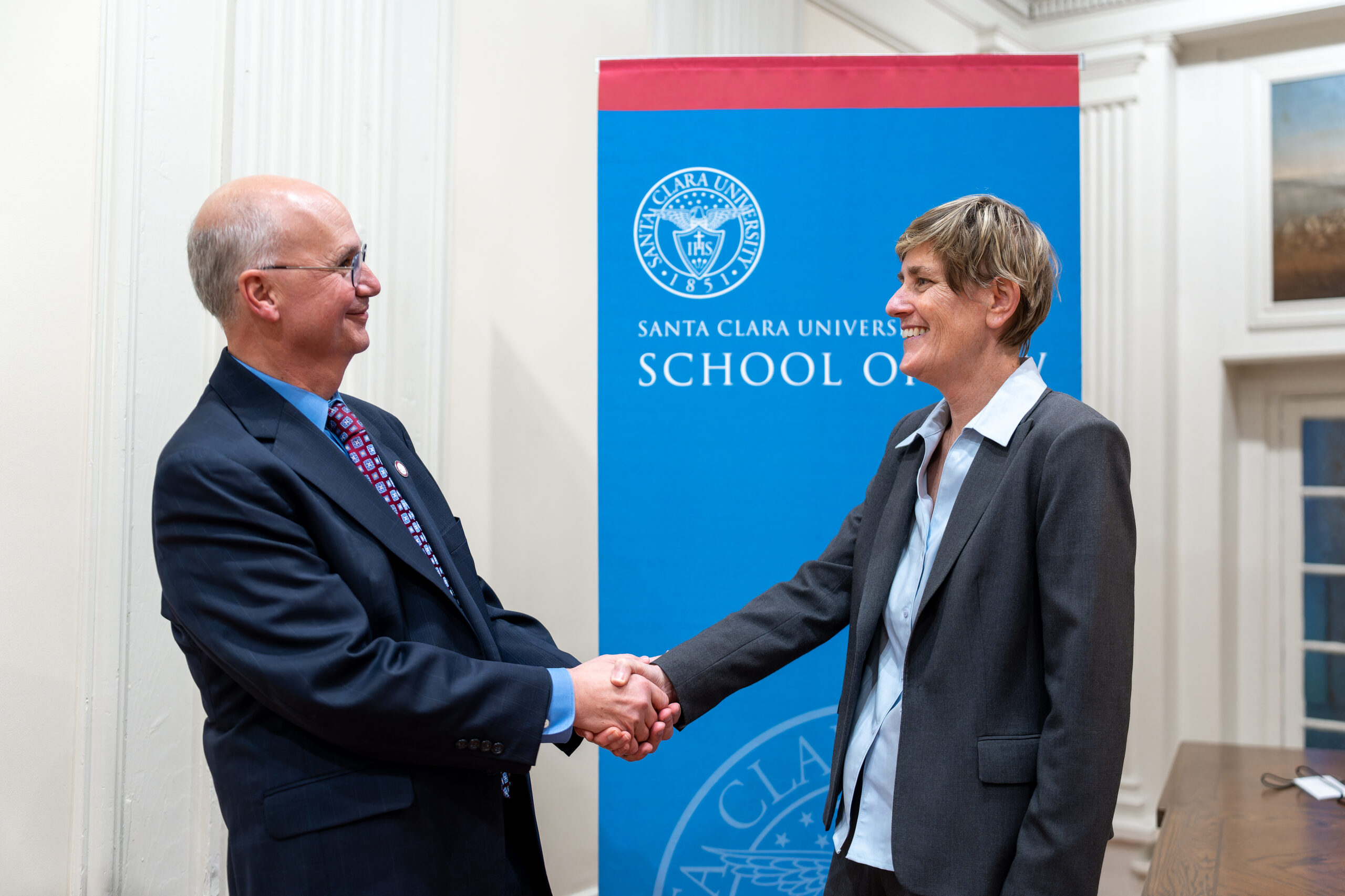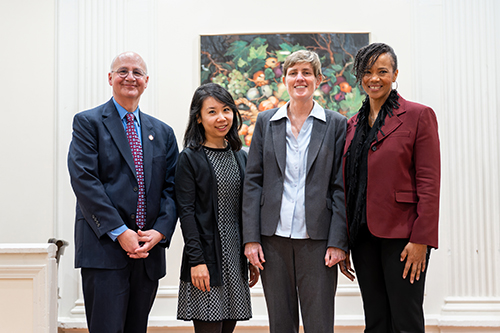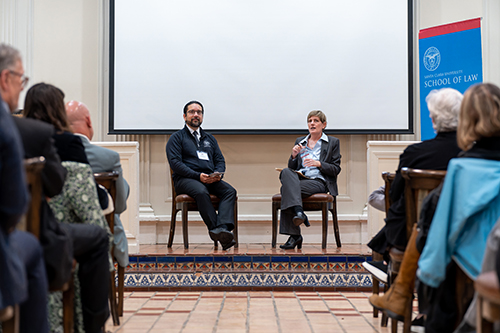
On March 21, Santa Clara University School of Law faculty, staff, students, alumni, and friends gathered in the Adobe Lodge at SCU to celebrate and honor the 2023 Alexander Award Winner, Tara Berta, supervising attorney at the Cooperative Restraining Order Clinic (CROC) in San Francisco.
First awarded in 2008, the Katharine & George Alexander Law Prize was created through the generosity of the late Katharine and George Alexander to bring recognition to legal advocates who have used their careers to help alleviate injustice and inequity. (See a list of past Alexander Prize winners.)
Katharine Alexander practiced law for 25 years as a public defender for Santa Clara County and taught law courses at San Jose State University. George Alexander served as a professor of law at Santa Clara University for 34 years and as dean of its School of Law for 15 years. Both Katharine and George dedicated their lives to instilling in students and lawyers a commitment to justice. 
Chip, the son of George and Katharine Alexander, attended the evening with his wife, Laurie, while the Alexander’s daughter, Suzi, attended via live stream. The evening included introductory remarks; a talk by Tara Berta; a Q&A moderated by Francisco Rivera Juaristi, professor of law and director of the International Human Rights Clinic; and the presentation of the award and closing remarks by Santa Clara Law Dean Michael Kaufman.
ABOUT THE 2023 WINNER
Since 1999, Tara Berta has served as supervising attorney at the Cooperative Restraining Order Clinic (CROC) in San Francisco, where she leads a team that provides direct legal services to domestic violence, sexual assault, and stalking survivors. CROC empowers survivors of sexual assault, domestic violence, and stalking to understand their legal rights and options and provides free legal services to help enforce and protect those rights, with a particular focus on restraining orders, family law, Title IX, and Marsy’s Rights. Each year, CROC assists 750 to 1000 survivors to secure their personal safety, their children’s personal safety, and financial support.
 Beyond her work at CROC, Berta has served the community and helped shape policies in numerous ways. She served on the board of directors of Bay Area Women Against Rape from 1999 to 2018. She co-chaired San Francisco’s Domestic Violence Death Review Team from 2000 to 2015, reviewing domestic violence-related homicides, strengthening system policies and procedures, and identifying prevention strategies to reduce future incidents of domestic violence-related injuries and deaths. She served on the steering committee for the San Francisco Greenbook Initiative from 2000 to 2006, a collaborative of child welfare agencies, domestic violence service providers, batterer intervention programs, and San Francisco’s Unified Family Court, to improve policies and procedures within and across systems to better achieve safety and prevent further abuse of domestic violence survivors and their children. From 2001-04, she was a member of the Full Faith and Credit Steering Committee, an advisory committee to the National Council of Juvenile and Family Court Judges, a multi-disciplinary national effort to develop a practical guide for the effective issuance and enforcement of civil protection orders. Berta earned her J.D. in 1994 from the University of San Francisco School of Law and her B.A. from the University of California San Diego.
Beyond her work at CROC, Berta has served the community and helped shape policies in numerous ways. She served on the board of directors of Bay Area Women Against Rape from 1999 to 2018. She co-chaired San Francisco’s Domestic Violence Death Review Team from 2000 to 2015, reviewing domestic violence-related homicides, strengthening system policies and procedures, and identifying prevention strategies to reduce future incidents of domestic violence-related injuries and deaths. She served on the steering committee for the San Francisco Greenbook Initiative from 2000 to 2006, a collaborative of child welfare agencies, domestic violence service providers, batterer intervention programs, and San Francisco’s Unified Family Court, to improve policies and procedures within and across systems to better achieve safety and prevent further abuse of domestic violence survivors and their children. From 2001-04, she was a member of the Full Faith and Credit Steering Committee, an advisory committee to the National Council of Juvenile and Family Court Judges, a multi-disciplinary national effort to develop a practical guide for the effective issuance and enforcement of civil protection orders. Berta earned her J.D. in 1994 from the University of San Francisco School of Law and her B.A. from the University of California San Diego.
“Awarding the Alexander Law Prize to Tara Berta gave us the opportunity to recognize the less-recognized by shining a light on the incredible social justice work that’s done day in and day out,” said Deborah Moss-West J.D. ‘94, 2023 co-chair of the Alexander Prize committee and executive director of the Katharine and George Alexander Community Law Center. “Tara’s nomination received much support from colleagues, judges, and others who shared how she courageously and selflessly serves her clients and the profound impact she’s made in the community. When I asked Tara how she’s kept at it all these years, her response was simple, yet deep: ‘I just love what I do.’”
THE ALEXANDER PRIZE AWARD EVENING
In her welcoming remarks at the event, Moss-West shared some of the factors considered by the Alexander Prize award committee, which include a steadfast commitment to advancing human rights, the innovative nature of the nominee’s programs, the courage and self-sacrifice exemplified by the nominee, the sustainability of the nominee’s programs, and the number of people who have benefited from the nominee’s work. Moss-West also highlighted the powerful impact of Berta’s two decades of work and advocacy. 
Jerel McCrary, former managing director of Bay Area Legal Aid and long-time social justice advocate, introduced Berta, saying this work has always been a “real passion” for her. “[Tara] has always recognized the need to address systemic impediments that compromise the safety of survivors of violence,” he said. Jerel shared some powerful quotes from CROC clients, which he said best illustrated the five characteristics that make Berta the “exceptional lawyer and advocate that she is.” He highlighted Berta’s “limitless compassion for people of all backgrounds,” her “tireless dedication to her clients,” her “unambiguousness…there is never a doubt what she thinks,” he said; her “belief in client empowerment and her humility… Tara would rather celebrate the achievements of her colleagues than be in the spotlight,” he said.
In her brief remarks, Berta outlined her long history with CROC, which began when she joined as a law student volunteer, and she played a short video to illustrate the complexity and emotional nature of the work she does with clients. She also emphasized the powerful practice of deeply listening to the clients who come for help. “We don’t measure our success at CROC by how many restraining orders we get,” she said. “We measure our success based on whether the survivors we work with feel like we listened to them.” Berta also thanked her entire CROC team, which were in attendance; her parents, who also attended; and the entire Alexander family. “The work done by Katharine and George Alexander during their lifetimes to promote justice in an unjust world is a model for all of us for how and why to serve our communities,” said Berta.
At the end of the evening, Dean Michael Kaufman presented the award to Berta, thanked the Alexander family, and honored the legacy of Katharine and George Alexander. “It is because of their generosity, their vision, their leadership, and their sense of humanity and justice that we are able to gather today and celebrate and lift up Tara’s incredible work and achievements,” he said.
“Tara, thank you for your work and for your example,” Kaufman added. “I think we are all incredibly struck by the fact that you not only have a brilliant mind, but—much more importantly, at this Jesuit law school—you’ve got a beautiful heart. You do this work because you love it, and, as one of your clients said, you really are a miracle….[and] an example of a heart of gold and a heart of wisdom for our students. Thank you for being that example for all of us. Thank you for helping us answer our call to do justice and do right by the world.”